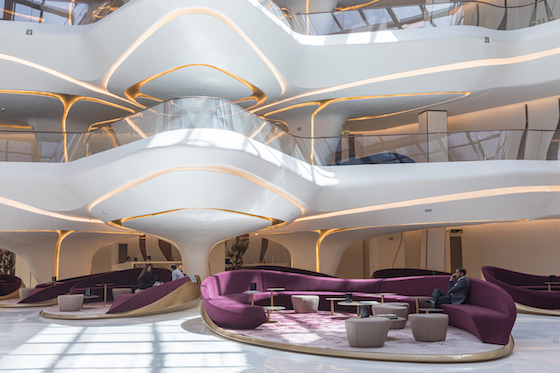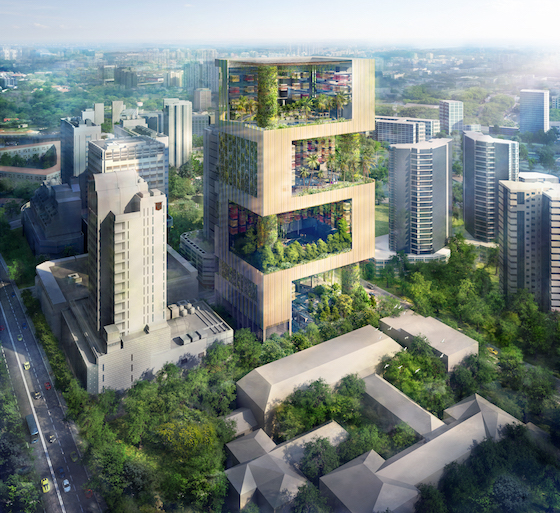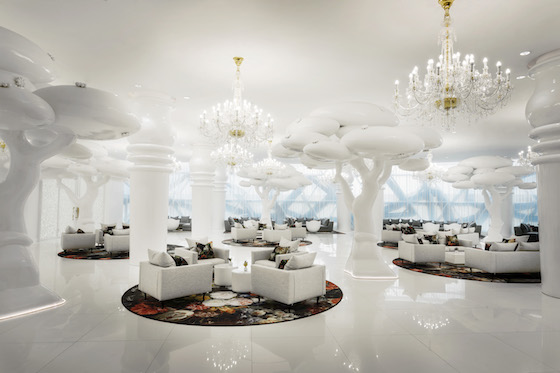As hotels take their first steps into coexistence with the coronavirus, hospitality designers are rethinking their approaches with imaginative solutions that are clever, not clinical, and spatial layouts that help physical distancing avoid feeling anti-social.
Contributed by Alicia Sheber
Their challenge: Deliver the human touch – without, necessarily, the touch of a human. HOTELS spoke with experts to find out how they are innovating to help their hospitality clients adapt to new realities and priorities wrought by the global pandemic.

Patrik Schumacher
Patrik Schumacher has led Zaha Hadid Architects since Zaha Hadid’s 2016 passing. Along with other projects, the company designed the ME Dubai hotel slated to open in September in The Opus, a building also by ZHA. What he says:
“We’ll need to provide greater spaciousness in our future hospitality projects, but we haven’t needed to do so yet. The ME Dubai in The Opus, both of which we designed, should have opened in March but was closed due to COVID. Once it’s occupied, we might need to ease crowding by redirecting guest flow so they don’t rub shoulders in the public areas.
“Our team scripted a digital tool with algorithms that redistribute floor plates, seats and tables to estimate the maximum people a space can have with social distancing, plus it suggests one-way systems for passages and elevators. A simulation capacity tool we’re creating functions like a video game where clients can move through the space and encounter people mimicking real-life behaviors in office and public spaces. We’re also developing a geometric tool that, using a building’s fixed dimensions, generates potential layouts to help us find the optimal solution, since measure complex designs is not always easy. We’re not relying on machine intelligence; we’re building on top of it.
“For quite a while we’ve focused on nature, green zones, outdoor spaces, and open windows. Wellness is crucial to a healthy, beneficial, and productive environment. I’m very sensitive to air quality, exchange levels and temperature… The first task of architects, engineers and developers should be creating a valuable and beneficial product from the outset, and secondly making it as energy efficient as possible.”
Tara Bernerd
Tara Bernerd’s interior architecture and design practice, Tara Bernerd & Partners, London, has worked on Four Seasons hotels in Fort Lauderdale, London and New York; one of its current project is the Equinox LA with lead architect Frank Gehry, among other projects. What she says:
“Hospitality spaces that link with the natural environment create a sense of personal connection. In city-centric hotels, we often use materials such as local stones, and if we’re creating a resort, we connect the inside and outdoor spaces.
“Designing lifestyle destinations during lockdown has been interesting… In order to develop a pitch for a resort somewhere warm and beautiful with lots of outdoor space, we asked our teams to take virtual holidays – look at hotels and beaches, order cocktails and really plan a trip. By being a bit creative in our approach, we ensured we didn’t lose that personal touch.”

Richard Hassell
Richard Hassell and Wong Mun Summ, founders of WOHA, Singapore, apply architectural solutions to climate change and urbanization. Projects include the Platinum Green Mark-rated Parkroyal on Pickering Hotel; due in 2021 is the zero-waste Pan Pacific Orchard. Both are in Singapore. What he says:
“We’re currently developing a boutique hospitality project with 8M in Singapore, an adaptive reuse of a heritage building featuring apartment-style rooms with small kitchens. This minimizes daily interactions with strangers, with an infection risk similar to staying in your personal apartment… Shared-economy concepts are conducive to businesses forced to give up their brick-and mortar retail or office spaces. And once people resume traveling, apartment sharing/rental platforms might prove even more popular for privacy reasons.
“Hotel design should address the climate emergency. Buildings use over 60% of energy worldwide, so they are key to decarbonizing. This has been a driving force as we push to develop even better strategies for environmental and social sustainability.”

Gabriele Chiave
Gabriele Chiave is creative director of Marcel Wanders’ Amsterdam-based studio, focusing on holistic solutions, with a portfolio including the Andaz Amsterdam Prinsengracht and Mondrian Doha. What she says:
“Since some people will begin to travel, we’re working with clients to reimagine their reception areas and create private, intimate spaces with reconfigured seating areas. While we want guests to feel free to roam, we also want to respect everyone’s right to their personal space. By showing them new ways to think about welcoming people into their hotel, we’re making sure every guest can still experience a personal and meaningful connection with our design that stays with them after they leave.
“We will stay on our path towards the use of more sustainable materials and find more and more ways to bring nature indoors, which we already do. We’re approaching spaces a little differently in response to the pandemic, concentrating more on what contact is necessary and what can be eliminated, which in some ways actually enhances the guest experience. The flow of traffic in and out of public and private spaces is also being considered as we find ways to give people more room.”
Cristina Laurijssen
Cristina Laurijssen leads Rosewood Hotel Group’s design of luxury hotel projects in the EMEA, including The Crillon in Paris. She is guiding the design of hotels in Vienna, due to open in 2022, as well as properties in London, Munich and Venice.
The shared economy might evolve with more careful pairings of people who trust how each other runs their business or maintains cleanliness. People have missed community and connections, so they won’t want to hide in their rooms. Public area designs still need to be animated to keep a nice vibe and allow people to connect without guests being on top of each other. Different zones within one big area will cater to different privacy preferences and give guests options besides their rooms.
People doing at-home workouts may prefer to use their guestroom as their gym, adding to the yoga mats and weights we already provide with virtual mirrors that help exercise routines. Concerns about carbon emissions and taking less flights have sped up as we see the benefits of reduced pollution. Innovative materials, cleaners and UV lights will quickly evolve and become widely available because they’re the norm, not the exception.
